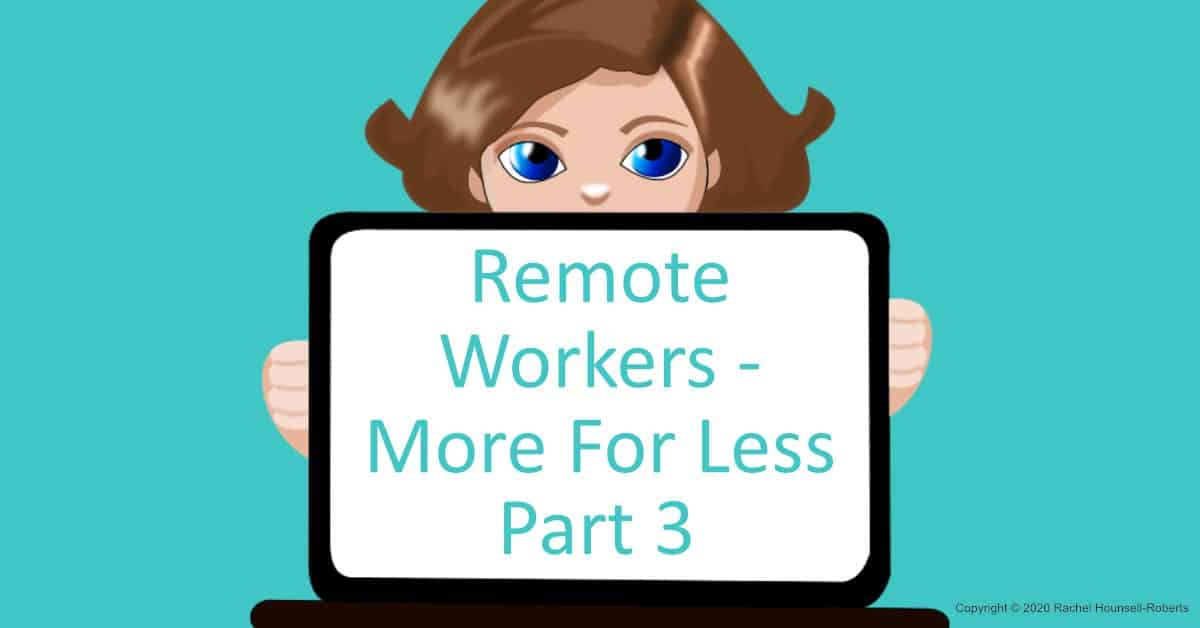Are Remote Workers a force for change? For owners ambitious to scale-up, could remote workers be the answer to skills shortage, diversity, and a healthier and more stable workforce? How could joined up thinking with remote workers create a more flexible and robust business?
Remote workers
In this three-part series, we look at three aspects of mobile working. In part-one we looked at how telework can reduce the cost of office space and recruitment. Part-two examined increased productivity with some examples of tools. In this final episode we look at more of the people aspects of remote workers.
Mistrust

Let’s tackle the elephant in the room. Despite many studies showing increased productivity, there’s a worry that remote workers will take advantage. The bigger issue is motivation with over two thirds of staff disengaged. If we can trust pupils to revise for GCSEs during study leave, why can’t we trust staff to get on with their work? The answer to that question is not what I’m writing about here, however in short if you can’t trust your staff, you’ve got a bigger problem.
Management
The management of remote workers is a big topic. I’ll share some of the lessons that I’ve learnt working with knowledge workers.
Overloading staff with work is counterproductive. Staff need time to reflect and improve. It’s also easier to manage work when the goals of staff align with the business. Both sides must accept a level of give and take, and that’s easier with healthy relationships. Empowered staff that mutually agree goals and objectives are likely to be more engaged. This leads to motivated and autonomous remote workers. Measurement should be meaningful, mutually agreed and aligned to business outcomes.
You can empower staff with better systems and giving them timely information when they need it. Our Business System: An Essential Guide to Growth guide will help you design a robust system for better results.
Happy and Healthy

Daily commutes can be stressful and tiring, which is not a great start to the day. Often staff can be stressed about getting away on time to pick up kids or attend a medical appointment. Stressed people in the fight or flight, their brains hijacked by stress hormones, are less effective. Tasks take longer, and they tend not to be as creative. Imagine having staff that have more energy and are more creative.
Staff value having flexibility. That might value that to meet family commitments or manage a health issue. They may find it easier to fit in exercise, which is good for their health and performance. Reduced travelling costs could also help, rather like having a tax-free pay rise. Working from home is likely to reduce absence, as staff feel able to work at home when recovering. This leads to staff that are more motivated to work for you, and likely to stay longer.
The downside of working from home is isolation, lack of support and worries about career progression. As mentioned in Part-two there are tools and ways of working to help. Tech only goes so far and senior leaders will need to think it through. On the flip side, thinking it through may open better ways of supporting staff that will benefit staff and the business.
Access to skills

Some businesses select their location to have access to resources. Remote working enables businesses to access a larger talent pool. This also has the advantage of retaining good staff when circumstances change. That could be due to moving further away, a family or health commitments that would otherwise cause them to leave. One example is a person that might have health issues and need more routine check-ups. Retaining experienced staff retains knowledge and reduces cost of replacement. Having a wider pool of resources increases the chance of getting the skills needed to grow.
Flexible
Staff attraction to flexibility for a better work life balance works both ways. Growth has peaks and troughs, making it difficult for owners to resource. Owners can smooth out the workload with flexible working, more in favour of staff when work is lighter, and more for the business with increased demand. A fair balance for both parties is important. Measurements help owners better plan for taking on more resource.

Summary
Having a loyal, flexible, diverse, and happy workforce, with access to skills makes for a more robust business. Productivity of remote workers is not a given. Leaders must think it through to get the most out of their staff and use of tech. Mobile working requires a management approach based on trust, cooperation, and motivation. Tech combined with good management can be hugely beneficial.

